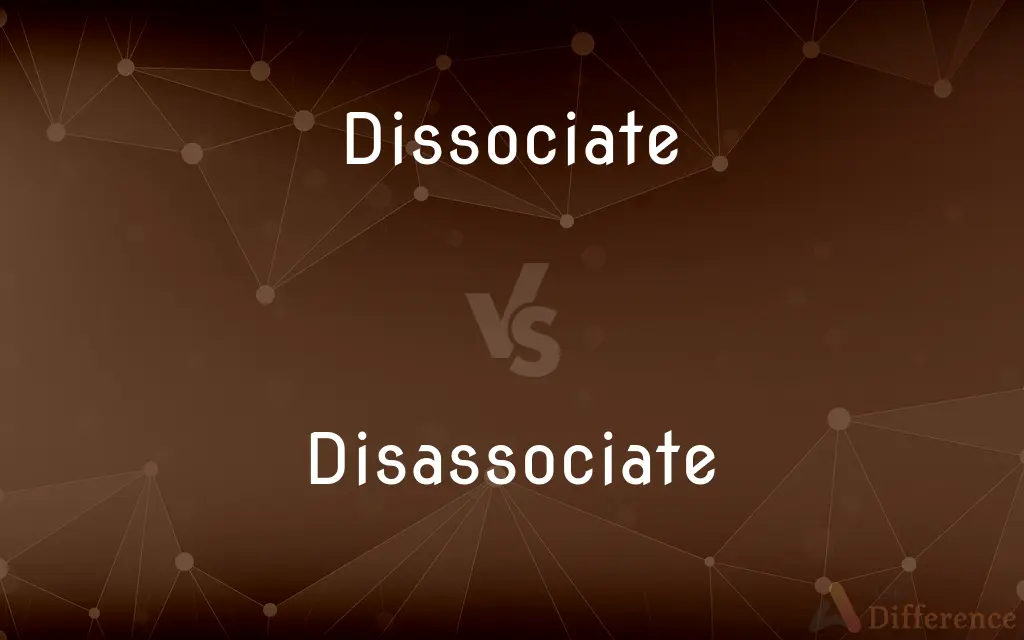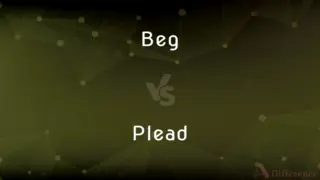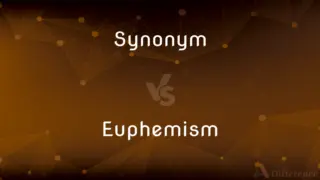Dissociate vs. Disassociate — What's the Difference?
By Tayyaba Rehman — Updated on October 22, 2023
Dissociate and Disassociate both mean to detach or separate oneself, but Dissociate is more commonly used in psychology, while Disassociate is a less frequent variant in general contexts.

Difference Between Dissociate and Disassociate
Table of Contents
ADVERTISEMENT
Comparison Chart
Definition
To detach or separate oneself.
A variant meaning to detach or disconnect oneself.
Common Usage
More prevalent, especially in psychological contexts.
Less common variant used in general situations.
Origin
Derived from Latin and has been in English for centuries.
A more modern variant of Dissociate.
Linguistic Preference
Preferred for its directness and historical presence.
Sometimes seen as redundant due to the added "dis-".
Associated Contexts
Psychological detachment, separation of feelings, or thoughts.
General separation or disconnection from groups, beliefs, or situations.
ADVERTISEMENT
Compare with Definitions
Dissociate
To detach oneself from a particular experience or emotion.
He tends to dissociate when discussing traumatic events.
Disassociate
To sever ties or relationships.
She decided to disassociate from her past friendships.
Dissociate
In psychology, to detach from reality.
Dissociative disorders can be deeply distressing for patients.
Disassociate
To disconnect or separate from something.
She wanted to disassociate herself from the rumors.
Dissociate
To regard or treat as separate.
It's hard to dissociate work from personal life in a remote setup.
Disassociate
To remove any linkage or connection.
He aimed to disassociate his name from the scandal.
Dissociate
To remove from association; separate
"Marx never dissociated man from his social environment" (Sidney Hook).
Disassociate
To end an affiliation or association.
The organization decided to disassociate from its parent company.
Dissociate
(Chemistry) To cause to undergo dissociation.
Disassociate
To regard as unrelated or distinct.
It's crucial to disassociate personal biases from professional decisions.
Dissociate
To cease associating; separate; part.
Disassociate
To remove from association; dissociate.
Dissociate
Chemistry & Psychiatry To undergo dissociation.
Disassociate
To separate (oneself); to dissolve one's association with a person, group, or situation.
After the scandal, the political party disassociated itself from the questionable candidate.
If the whole membership disassociates, the result will be disestablishment.
Dissociate
(transitive) To make unrelated; to sever a connection; to separate.
A number of group members wish to dissociate themselves from the majority.
Disassociate
(transitive) To separate into smaller discrete units, as with analysis.
The problem is easier to understand if you disassociate the variables.
Dissociate
(intransitive) To part; to stop associating.
After the big fight, the gang totally dissociated from each other.
Disassociate
To separate; to disunite; to disintegrate; to dissolve.
The fibers of this nonwoven textile disassociated when I tried to wash it.
Dissociate
To separate compounds into simpler component parts, usually by applying heat or through electrolysis.
We dissociated the lead iodide into its elements by heating
Disassociate
To disconnect from things associated; to disunite; to dissociate.
Dissociate
To undergo dissociation.
Disassociate
Part; cease or break association with;
She disassociated herself from the organization when she found out the identity of the president
Dissociate
To undergo dissociation.
Gerald checked himself into the hospital because he was dissociating.
Dissociate
To separate from fellowship or union; to disunite; to disjoin; as, to dissociate the particles of a concrete substance.
Before Wyclif's death in 1384, John of Gaunt had openly dissociated himself from the reformer.
Dissociate
Part; cease or break association with;
She disassociated herself from the organization when she found out the identity of the president
Dissociate
Regard as unconnected;
You must dissociate these two events!
Decouple our foreign policy from ideology
Dissociate
To undergo a reversible or temporary breakdown of a molecule into simpler molecules or atoms;
Acids dissociate to give hydrogen ions
Dissociate
To separate or disconnect.
She tried to dissociate herself from the controversial group.
Dissociate
To remove any association with.
The brand decided to dissociate from the controversial figure.
Common Curiosities
Is Disassociate just an extended form of Dissociate?
Yes, some view the "dis-" in Disassociate as redundant since Dissociate already conveys separation.
Are Dissociate and Disassociate synonymous?
Yes, they can be used interchangeably, though Dissociate is more common.
Can I use Disassociate in a psychological context?
While you can, Dissociate is more commonly used in psychological settings.
Which term is more prevalent in American English?
Dissociate is more prevalent, but both terms are understood.
Are there any specific contexts where one is preferred?
Dissociate is favored in psychology, while Disassociate can be found in broader contexts.
Do both words have the same Latin origin?
Yes, both trace back to Latin, with Dissociate having a longer history in English.
Which word is older in the English language?
Dissociate has been in use for longer than Disassociate.
Are there any major differences in meaning between the two?
Their core meanings are similar, but usage and context can introduce nuances.
Is one term more formal than the other?
Both terms can be used formally, but Dissociate is generally more accepted.
Can they be used in the same contexts?
Generally, yes. But it's good to note the specific resonance of Dissociate in psychology.
Is it wrong to use Disassociate?
No, it's a valid word, but it's less common than Dissociate.
Is one word longer than the other?
Yes, Disassociate has an added "dis-" prefix, making it longer.
Do dictionaries list both words?
Yes, most comprehensive dictionaries list both Dissociate and Disassociate.
Is Disassociate a modern invention?
It's more modern than Dissociate, but both have been in use for some time.
Does Dissociate only refer to psychological detachment?
No, it can refer to any form of separation, but it holds specific weight in psychology.
Share Your Discovery

Previous Comparison
Beg vs. Plead
Next Comparison
Synonym vs. EuphemismAuthor Spotlight
Written by
Tayyaba RehmanTayyaba Rehman is a distinguished writer, currently serving as a primary contributor to askdifference.com. As a researcher in semantics and etymology, Tayyaba's passion for the complexity of languages and their distinctions has found a perfect home on the platform. Tayyaba delves into the intricacies of language, distinguishing between commonly confused words and phrases, thereby providing clarity for readers worldwide.















































